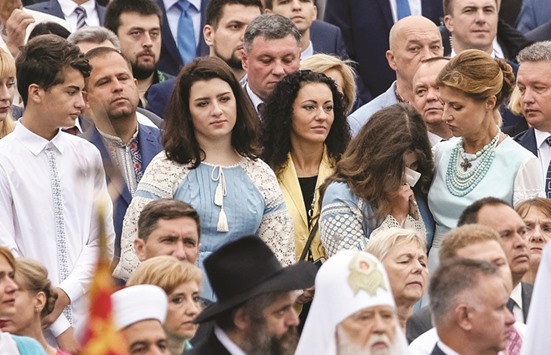Thousands of soldiers saluted Ukrainian President Petro Poroshenko on the same square where a pro-EU revolution in 2014 ousted a Moscow-backed leader and left former master Russia fuming.
Poroshenko used yesterday’s event to take a dig at Russian president Vladimir Putin for famously calling the Soviet Union’s 1991 collapse “the greatest geopolitical catastrophe of the 20th century”.
“We were the ones who created what Putin later called the ‘greatest geopolitical catastrophe’,” Poroshenko declared in a speech to the nation as hundreds of Ukrainian blue and yellow flags fluttered in the damp wind.
“Looking back at more than two years of war, we can confidently say that our enemy failed to achieve a single goal — it was not able to bring Ukraine to its knees.”
More than 9,500 people have died and 2mn forced from their homes in fighting between government forces and pro-Russian militias in two major industrial regions in the east that rebels have partially controlled since April 2014.
Ukraine yesterday reported the death of one soldier in what has recently turned into increasingly intense warfare.
Kiev also lost its strategic Black Sea peninsula of Crimea when it was seized by Russian soldiers on Putin’s orders and annexed in March 2014.
Putin’s actions plunged the Kremlin’s relations with the West to a post-Cold War low that has complicated global attempts to find solutions to raging crises like the Syrian war.
But Russia has only ramped up its campaign to prop up Syrian president Bashar al-Assad and this month escalated tensions with Ukraine by accusing it of plotting an incursion into Crimea.
Putin has repeatedly denied involvement in the separatist conflict and described Russians captured or spotted in the war zone as off duty soldiers and volunteers who were “following the call of their heart”.
But Kiev and the West accuse Russia of backing the insurgency in order to keep the Ukrainian leaders off balance and constantly dependent on the Kremlin’s whims.
Both the United States and the European Union have imposed stiff economic sanctions on Kremlin-linked companies and members of Putin’s inner circle that helped push Russia into an 18-month recession.
US secretary of state John Kerry said in a message that “despite Russia’s aggression in eastern Ukraine and its illegal occupation of Crimea, you have worked steadily to build stronger and more effective political, economic, and cultural institutions.
“These efforts have required perseverance and sacrifice, for which I applaud you,” he said.
Poroshenko also thanked visiting Polish counterpart Andrzej Duda for sending some of his soldiers to the Kiev parade in a show of resolve against Putin’s increasingly militant stance.
Yet Ukraine remains mired in state graft that has delayed the release of IMF funding and still suffers from the domination by a handful of shadowy tycoons whose control of politics stretches back into the 1990s.
The Soviet Union crumbled in the wake of a failed August 1991 putsch by Communist hardliners who were trying to suppress the independence movements launched in the three Baltic states in 1990.
A domino effect followed that saw Ukraine break from Russia on August 24.
The Soviet Union continued to unravel until Kazakhstan became the last of the 15 former socialist republics to declare its independence on December 16 — four days after Russia did so.

